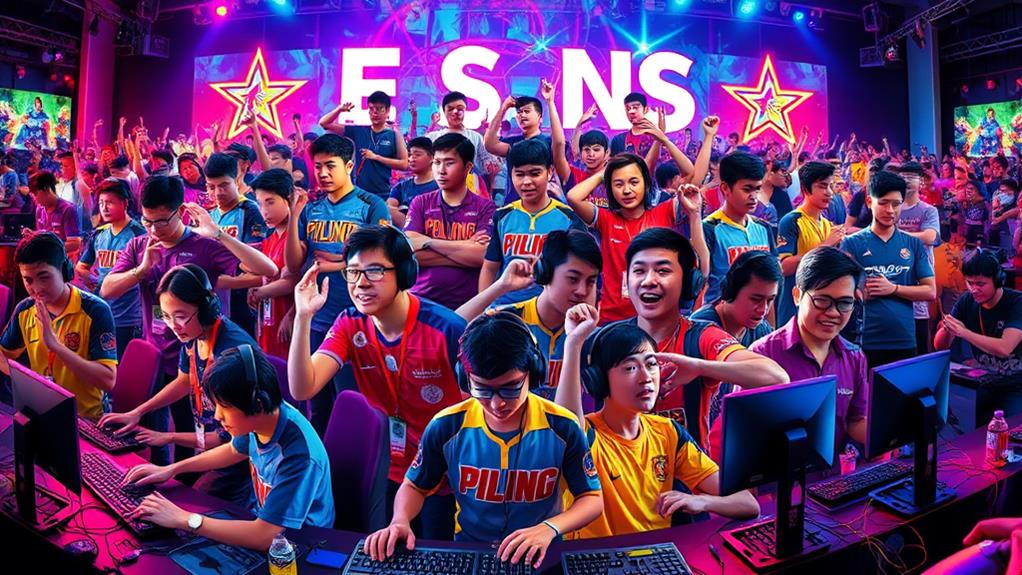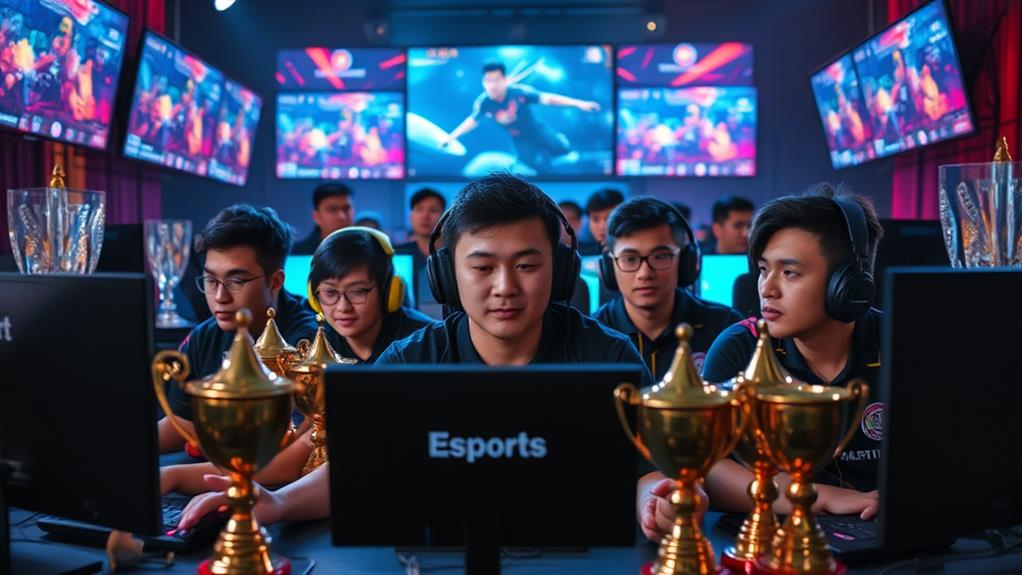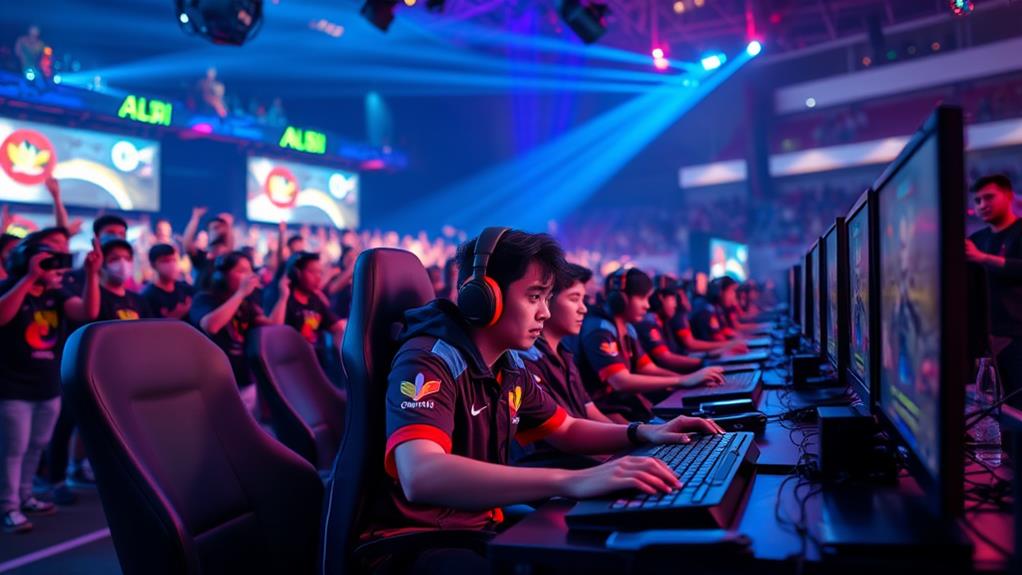The Filipino e-sports industry is growing rapidly, with a market growth rate of 12.9% annually. This growth is driven by popular games like Mobile Legends: Bang Bang, which dominates the scene. Filipino teams such as Blacklist International and Bren Esports have made a name for themselves in international competitions.
Major e-sports events in the Philippines attract a large audience, with the MPL (Mobile Legends Professional League) drawing in over 950,000 viewers. This high level of engagement demonstrates the significant interest in e-sports in the country.
Despite the growth, the industry still faces challenges. One major issue is the limited local support for e-sports, which hinders its development.
Another challenge is the misconception that e-sports is a temporary trend, which affects its legitimacy and recognition.
Investments and educational programs are key to overcoming these challenges. Strategic investments can help provide the necessary resources for teams and athletes to grow and compete.
Emerging educational programs can also help change the perception of e-sports and provide a pipeline of skilled players and professionals.
Overview of Filipino Esports

The Philippines has one of the fastest-growing esports markets, with an annual growth rate of 12.9% since 2017. This growth is driven by the popularity of games like Mobile Legends: Bang Bang, which has become a staple in the competitive scene.
In fact, the Mobile Legends: Bang Bang Professional League (MPL) has reached over 950,000 viewers in its 2023 Season 11.
Major esports organizations are leading the charge in this competitive landscape. Blacklist International, Bren Esports, and Omega Esports are among the prominent teams actively participating in both local and international tournaments.
Their achievements have put Filipino teams on the global stage, with notable appearances in events like the VALORANT Champions Tour (VCT) and the Manila Major.
The Philippine Esports Organization (PeSO) plays a crucial role in supporting this ecosystem, enabling professional players to secure athletic licenses and compete internationally.
As a result, the Philippines is solidifying its position as a key player in the world of esports.
Key Players and Teams
Key Players and Teams in Filipino Esports
The Philippines has produced several notable esports teams and players, achieving international recognition and acclaim.
Top Performing Teams
Blacklist International has established itself as a leading esports organization, garnering international recognition through its impressive tournament performances.
Bren Esports made history by winning the M2 World Championship in Mobile Legends: Bang Bang, showcasing the country's depth of talent.
Omega Esports has built a reputation as a formidable contender in both Mobile Legends and VALORANT, highlighting the versatility of Filipino esports teams.
Dota 2 Powerhouses
Execration and TNC Predator have consistently demonstrated their prowess in Dota 2, significantly contributing to the growth of the local and international Dota 2 community.
Regulatory Support
The Philippines Esports Organization (PeSO) plays a crucial role in regulating and promoting professional esports in the country.
Growth Opportunities and Challenges

The growth of Filipino esports teams and athletes presents both opportunities and challenges. The Philippine esports market has experienced a consistent 12.9% annual growth rate since 2017, indicating a thriving environment for local teams. This growth is largely driven by the popularity of mobile gaming, particularly titles like Mobile Legends: Bang Bang, which has attracted 2.65 million daily active gamers.
However, challenges persist. Local leagues struggle with limited viewer engagement, with fewer viewers tuning in compared to international competitions.
Additionally, there is a lingering perception that esports is a fleeting trend, and the lack of dedicated esports venues and government support hinders the quality of competition and player experience.
To overcome these challenges, collaboration among stakeholders and strategic investment in grassroots development are essential. This can create a more robust environment for local athletes and organizations, ultimately transforming challenges into opportunities for sustained growth in the esports arena.
How Has Government Support Contributed to the Rise of Filipino E-Sports Teams and Athletes?
The rise of Filipino e-sports teams and athletes can be attributed to the significant role of government in philippine sports. Through funding, infrastructure development, and training programs, the government has provided crucial support that has helped e-sports grow and flourish in the country, creating opportunities for talented individuals to excel.
Major Tournaments and Events
Major Tournaments and Events Drive Esports Growth in the Philippines
The Philippine esports scene thrives on the excitement generated by major tournaments and events, which showcase local talent, foster community engagement, and draw international attention.
These competitions highlight emerging talent and further enhance the country's reputation in the esports landscape.
Key Tournaments Shaping the Philippine Esports Scene
Several prominent tournaments have emerged as critical platforms for Philippine esports. These include:
- Mobile Legends: Bang Bang Professional League (MPL), which features Mobile Legends: Bang Bang and has drawn over 950,000 viewers during its Season 11 peak.
- The Nationals, a premier esports league in the country, featuring multiple game titles.
- Philippine Pro Gaming League (PPGL), a platform for emerging talent and established teams, featuring various games.
- PBA Esports Bakbakan, a unique crossover with the Philippine Basketball Association, featuring basketball-themed esports.
The Importance of Esports Events
These events are crucial for the growth and recognition of Filipino teams and athletes.
They provide a platform for local talent to shine, foster community engagement, and draw international attention to the country's esports scene.
Future of Esports in the Philippines

The Philippine esports market is projected to reach $1.5 billion by 2025, driven primarily by the popularity of mobile gaming. Titles such as Mobile Legends and VALORANT are contributing to this growth, captivating both audiences and players.
Esports is now recognized as a legitimate sport in the Philippines, with the government providing pathways for professional players to obtain athletic licenses. This recognition not only increases the visibility of Filipino gamers but also enhances their career prospects, allowing them to compete internationally.
Dedicated esports venues are emerging, providing essential infrastructure that elevates competition quality and player experiences. For instance, these venues offer better equipment, internet connectivity, and seating arrangements, creating a more immersive experience for players and spectators.
Additionally, esports education programs, such as the Bachelor of Science in Esports at Lyceum of the Philippines University, are being established to nurture a new generation of esports professionals.
Collaboration among stakeholders is crucial to maximize growth potential and create a sustainable esports ecosystem. This includes cooperation between the government, private investors, and esports organizations to provide resources, infrastructure, and support for the industry.
The future of esports in the Philippines looks promising, with the country poised to make a significant mark on the global stage.
Questions and Answers
Why Are Esports Popular in the Philippines?
Esports thrive in the Philippines due to a strong gaming culture. This culture is built on a competitive spirit and community building. Local tournaments, for example, the Philippine Pro Gaming League (PPGL), bring together young gamers who share a passion for competition.
These events foster youth engagement and provide a platform for players to connect with each other.
Streaming platforms play a significant role in enhancing social interaction. Fans can engage with their favorite gamers through live streams on platforms like Facebook Gaming and Twitch.
This interaction helps build a loyal fan base and encourages participation in esports.
Technological accessibility has made gaming more accessible. The widespread availability of affordable gaming PCs and internet has created a dynamic environment that fuels interest and participation in esports.
As a result, esports have become a significant part of the Filipino entertainment landscape.
What Caused the Rise of Esports?
The rise of esports is attributed to the combination of competitive gaming and digital culture.
Competitive gaming has become more accessible due to technological advancements, leading to increased youth engagement. For instance, the widespread adoption of high-speed internet and powerful gaming consoles has enabled smoother and more immersive gaming experiences. This, in turn, has made gaming more appealing to a younger audience.
Social interaction is enhanced through streaming platforms, allowing players to connect and share experiences. Twitch, a popular streaming platform, has over 2 million streamers, providing a space for gamers to interact with each other and build communities. This social aspect of gaming has contributed significantly to the growth of esports.
Increased accessibility of tournaments has boosted participation, with online platforms making it easier for gamers to participate in competitions. The proliferation of online tournaments has reduced barriers to entry, enabling gamers from diverse backgrounds to participate and compete against each other.
Global recognition has elevated the status of esports, with many countries recognizing it as an official sport. The International Olympic Committee, for example, has considered including esports in the Olympic Games, further legitimizing its status as a competitive sport.
This recognition has attracted more participants, spectators, and sponsors, contributing to the growth of the esports industry.
Why Do a Lot of Filipinos Play Mobile Legends?
Accessibility is a key reason many Filipinos play Mobile Legends. This is because the game is easily accessible on mobile devices, allowing players to join the gaming culture anywhere, anytime.
The game's competitive spirit keeps players engaged, as they strive to climb the ranks and become better players. Additionally, local tournaments foster community engagement, bringing players together to compete and socialize.
Mobile Legends also strengthens social connections with friends. Players can team up with friends to play together, making the game a social activity.
Streaming platforms showcase gameplay, attracting youth involvement. Many professional players and streamers share their gameplay on platforms like YouTube and Facebook, inspiring younger players to join the game.
Mobile Legends has become a cultural phenomenon in the Philippines. With over 43 million active gamers, the game has become an integral part of the country's gaming culture.
It's not just a game; it's a way of life for many Filipinos.
How Many Esports Players Are There in the Philippines?
The Philippines has a large and growing esports community, with over 43 million Filipino gamers. This community is driven by online tournaments, where players compete against each other to gain recognition and showcase their skills.
As top players emerge, they attract sponsorship deals that further boost the esports scene. These gaming communities focus on skill development, enhancing player performance and fostering camaraderie among aspiring esports athletes nationwide.